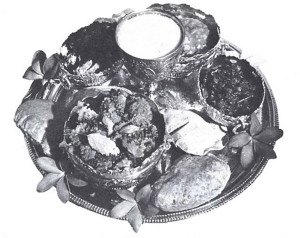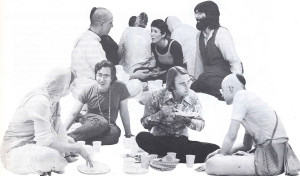 Krsna consciousness is the original energy of the eternal spirit soul. This devotional service or bhakti-yoga is not like a religion or yoga process in which one engages part-time, once every Sunday, or for an hour in the morning. Actually, it is the natural activity of the liberated soul. It concerns every sphere of life. There is a Krsna conscious way to do everything—a way to eat and sleep, a way to mate and defend, a way to do physical labor, business and farming, a way to administer and govern, and a way to perform intellectual work. There is a Krsna Conscious way to be a student, a householder, a retired person or a renounced man. In all activities, in all statuses and classes of life, we can do things in the transcendental way of Krsna consciousness. Since eating is one of the most basic and important of all activities, this article discusses the Krsna conscious way to eat.
Krsna consciousness is the original energy of the eternal spirit soul. This devotional service or bhakti-yoga is not like a religion or yoga process in which one engages part-time, once every Sunday, or for an hour in the morning. Actually, it is the natural activity of the liberated soul. It concerns every sphere of life. There is a Krsna conscious way to do everything—a way to eat and sleep, a way to mate and defend, a way to do physical labor, business and farming, a way to administer and govern, and a way to perform intellectual work. There is a Krsna Conscious way to be a student, a householder, a retired person or a renounced man. In all activities, in all statuses and classes of life, we can do things in the transcendental way of Krsna consciousness. Since eating is one of the most basic and important of all activities, this article discusses the Krsna conscious way to eat.
By Ravindra Svarupa Dasa
You Are What You Eat [1]
Food is so important that the gradations of human beings and animals can be calculated according to their eating processes. In human society, for example, the dog-eater is considered to be the lowest, while among animals the stool-eater is likewise lowest. Indeed, George Bernard Shaw wrote a book called You Are What You Eat. The eating process is important, for if one cats like a cat or dog, he’ll become like a cat or dog, even in this life.
In Bhagavad-gita there is a discussion of food in terms of the modes or qualities of material nature. Material nature is said to be made Lip of three modes (gunas), namely, goodness, passion and ignorance, and when the living entity or spirit Soul comes into contact with the material nature, he becomes conditioned by the modes.
The mode of goodness is purer than the others, and one in goodness develops knowledge and becomes conditioned by happiness. The mode of passion is born of unlimited desires and longings, and one in passion becomes bound to the fruits of his actions. Moroseness and sleepiness characterize a person in ignorance, and he becomes conditioned by madness.
Krsna further explains to Arjuna in the Seventeenth Chapter of the Gita that persons situated in different modes are attracted to different kinds of food. The Supreme Lord says: “Foods in the mode of goodness increase the duration of life, purify existence, give strength and increase health, happiness and satisfaction. Such foods are juicy and fatty, and they are very conducive to the health of the body. Food that is too bitter, too sour, too salty, too pungent, too dry or too hot causes distress, misery and disease. Such food is very dear to those in the mode of passion. Foods prepared more than three hours before being eaten, which are tasteless, juiceless, decomposing, which have a bad smell, and which consist of remnants and untouchable things, are very dear to those in the mode of darkness.” (Bhagavad-gita, 17.8-10)
Thus a person eats according to his conditioned state. Whether one is situated primarily in goodness, passion or ignorance, he is still bound by the ropes of material nature. One may avoid untouchable things like meat and liquor and cat only milk products, Sugar, rice, wheat, fruits, vegetables and other foods dear to those in the mode of goodness. He may take his animal fat from milk and his protein from peanuts, whole wheat, dahl, etc., thus avoiding the subhuman practice of slaughtering animals. Yet still he will remain situated within the material energy and will be bound by karmic reaction. Vegetarianism is not enough. It is necessary to transcend the modes of material nature, even in eating: “When he is able to transcend these three qualities, the embodied being can become free from birth, death, old age and their distresses and can enjoy nectar even in this life.” (Bg. 14.20)
Acting Without Acting
 Krsna points out, “No one can refrain from doing something, not even for a moment.” (Bg. 3.5) One has to act because the living force is by nature active. But, for an embodied being, each and every action produces a reaction, good or bad, that binds him to the material world. This is called karma. Yet how can we stop acting? If we want to eat we have to act, and eating is one of the necessities of life; if we stopped eating we would die. However, when we eat food prepared to satisfy our hunger, with each mouthful our involvement in the complexities of material nature deepens. The karma is there.
Krsna points out, “No one can refrain from doing something, not even for a moment.” (Bg. 3.5) One has to act because the living force is by nature active. But, for an embodied being, each and every action produces a reaction, good or bad, that binds him to the material world. This is called karma. Yet how can we stop acting? If we want to eat we have to act, and eating is one of the necessities of life; if we stopped eating we would die. However, when we eat food prepared to satisfy our hunger, with each mouthful our involvement in the complexities of material nature deepens. The karma is there.
This is the dilemma of all embodied souls—how to act without entanglement. This is the same dilemma that perplexed Arjuna on the Battlefield of Kuruksetra. There was no question of Arjuna’s not fighting in the battle, but Krsna instructed him how to fight. The Supreme Personality of Godhead said: “O son of Kunti, all that you do, all that you eat, all that you offer and give away, as well as all austerities that you may perform, should be done as an offering unto Me. Thus You will be freed of all reactions to good and evil deeds, and by this principle of renunciation you will be liberated and come to Me.” (Bg. 9.27-28)
This is the solution offered by the Supreme Lord to the dilemma of all embodied souls. When our actions are all done for Krsna, and not for ourselves, such actions produce no karma. Neither desiring nor hating the fruits of activities, one should simply do everything for the satisfaction of Krsna, and thus his consciousness will remain steadily fixed on the Supreme, though his actions appear to be ordinary.
With Love And Devotion
Thus Krsna wants us to eat only food offered first in sacrifice to Him. He says: “The devotees of the Lord are released from all sins because they eat food which is offered first for sacrifice. Others, who prepare food for personal sense enjoyment, verily eat only sin.” (Bg. 3.13)
The Krsna conscious person sees himself always as a servant of the supreme enjoyer. His meditation on Krsna is uninterrupted and steady, and he does not need to drop down to the level of material sense gratification to eat. In the kitchen, he is thinking of Krsna, for whom he prepares palatable dishes. He does not enjoy the food while he is preparing it, nor does he taste it, even to adjust the spices. Krsna is the first to enjoy. Then, with love and devotion, he offers the preparation to Krsna, who is the pleasure reservoir of the senses, and says pleasing prayers asking Krsna to please accept his offering. Krsna says: “If one offers Me with love and devotion a leaf, a flower, fruit or water, I will accept it.” (Bg, 9.26)
It is not that God is hungry and comes begging some food. No, Krsna is always self-satisfied, and whatever we offer Him is His to begin with. But He wants to set up a reciprocation, an exchange of feelings. He does not ask for an opulent feast—just a little water, a leaf or some fruit, which can be secured by any person under any circumstances. He does not say that He will accept meat, or fish, or eggs, and thus one who wants to satisfy Krsna will refrain from offering Him these things. Just simple vegetarian dishes should be offered—the necessary ingredient is love and devotion—and Krsna will accept them.
How Can God Eat?
Now one may think, “Well, all this sounds very nice, but one thing is missing. You’re assuming that God eats. But since God is spiritual, not material like us, how can He eat?” This is a good question. Krsna is spiritual, of course. But we have to understand what that means. If we try to figure out God on the power of our own intelligence, we may arrive at our idea of God in this way: “Spiritual is just the opposite of material; as we have material bodies which limit us, so God Must be spiritual and unlimited by any body. As I have hands and feet, so God must be without hands and feet: I have eyes, ears, a nose, and a tongue, and God must be eyeless, earless, noseless, tongueless and so on.” Nearly everyone speculates like this, and that’s why so many people have been led to believe that God is impersonal or void. Thus the idea of God’s eating becomes difficult to understand.
But we should consider, first of all, the worth of this speculative process. Since we are limited by our material bodies, how, by means of speculation, are we to have knowledge about an area far beyond the scope of our senses? Since we are enclosed in these material forms, we are conditioned by defective senses, by a propensity for error, by a tendency to be illusioned, and by a propensity to cheat. With these defects we can hardly figure out God. Unless we meet an authority who can give us definite information about God, we cannot know anything about Him. We can only have vague negative ideas. Because we thus stand in need of aid, Krsna Himself delivered positive knowledge about Himself to His disciples like Lord Brahma and Arjuna and arranged to have such knowledge handed down through an unbroken chain of perfect spiritual authorities. We can therefore read in Bhagavad-gita that Krsna says to Arjuna, “I am unborn, and My transcendental body never deteriorates.” (Bg. 4.6) He further states that the form which He displayed 5,000 years ago on this earth is His own original and transcendental form—not an assumed material form, like our own. Krsna is not embodied; He is not a spiritual spark covered by a material body. Rather, He is His own spiritual form, eternal and always young.
Thus, according to information from the spiritual chain of authority, God is equipped with all senses—sight, touch, taste, smell, etc. But His senses are spiritual. If we think about it, we can understand how this teaching makes much more sense than the impersonal conclusion.
Krsna is the Absolute Truth. This means that He is the origin or source of everything; whatever we can experience, spiritual or material, is an emanation from Him. Therefore our own mind, senses and intelligence are all creations of the Absolute Truth. This means that the Absolute Truth is not without mind, senses or intelligence. He is not impersonal. If He were lacking in senses or in intelligence, He would be less than His own creation. The very word “created” indicates that He has transcendental intelligence. Because Krsna is a person, we are persons. When a father begets a child, that child is equipped with hands and legs because the father has them. The child also has senses because his father has senses. Therefore sometimes it is said that man is made in the likeness of God. We have senses because Krsna, the Original Father, has senses.
But because Krsna’s senses are spiritual, they are not limited in the way that ours are limited. In our material body, each sense can only perform its own proper function, but in the transcendental figure of Krsna each and every limb possesses in itself the full-fledged functions of all the other organs. Each sense can perform the functions of all the rest. This means that He can walk with His hands, see with His hands, or eat with His eyes. In Bhagavad-gita Krsna says that He impregnated all living entities into the womb of material nature by His glance. This is the nature of the Lord’s spiritual form. Thus when we offer food to the Lord and he hears our prayers and sees the food on the altar, that seeing and hearing are wholly identical with His eating and enjoying the food. In this way, Krsna accepts Our offering and eats it.
You Are What You Eat [2]
 The remnants of food offered to Krsna are called prasadam. Prasadam means mercy. Krsna accepts the offering of food and then returns it to His devotee as His mercy, for Krsna Himself becomes the food which was offered to Him. Because the food is in contact with Krsna, it becomes spiritualized, Krsna-ized. Such food is transcendental, completely free from contact with the modes of goodness, passion and darkness. Prasadam is karma-less food, and anyone who takes Krsna prasadam advances in spiritual life. One may try to attain the Supreme by an assault of mental speculation, or by drilling the respiration, etc., but what is so nice and so easy as reaching the supreme destination simply by eating?
The remnants of food offered to Krsna are called prasadam. Prasadam means mercy. Krsna accepts the offering of food and then returns it to His devotee as His mercy, for Krsna Himself becomes the food which was offered to Him. Because the food is in contact with Krsna, it becomes spiritualized, Krsna-ized. Such food is transcendental, completely free from contact with the modes of goodness, passion and darkness. Prasadam is karma-less food, and anyone who takes Krsna prasadam advances in spiritual life. One may try to attain the Supreme by an assault of mental speculation, or by drilling the respiration, etc., but what is so nice and so easy as reaching the supreme destination simply by eating?
Because food offered to Krsna is prepared with love and devotion for the Supreme Personality of Godhead and is accepted by His mercy after it is offered to Him, no karma attaches itself to the food because nowhere is there any sense gratification or material desire. In preparing, in offering and eating Krsna prasadam, a person remains fixed in the transcendental position, absorbed in Brahman, spirit, and undeluded by the modes of nature. Eating in this way is the actual attainment of yoga- “A person is said to have attained to yoga,” Krsna says, “when, having renounced all material desires, he neither acts for sense gratification nor engages in fruitive activities.” (Bg. 6.4)
Renunciation is essential for any person serious about spiritual advancement. If a person claims to be engaged in yoga or spiritual development but does not firmly engage in renunciation of fruitive activities and sense gratification, he is a cheater or is being cheated by a cheater. Somehow or other one must prevent the senses from engaging in material activities of sense gratification this is taught by all authorities, including Lord Sri Krsna, Lord Buddha, Lord Jesus Christ, Sripada Sankaracarya, etc.
Once upon a time, many ages ago, a great devotee named Dhruva Maharaja practiced very severe yoga to realize God in six months. First he ate only fruits and berries every third day, and in the second month he ate dry grass and leaves every sixth day; in this way he progressed to taking only a little water every sixth day, and finally, he was taking a breath of air every twelve days. In this way, Dhruva Maharaja renounced sense gratification and realized God. Now, in this age, it is impossible for us to practice such severe austerities to control the senses. Who can do it, or even take the first steps? Therefore Krsna does not instruct, “Don’t eat.” Rather, He says, “Eat Krsna prasadam.” Eat sumptuously, and in that way renounce sense gratification ans fruitive activities.
Any person can prepare, offer and eat Krsna prasadam even at home, without inconvenience. Such a wonderful activity is very simple. It is the perfection of eating, and it is “everlasting and joyfully performed.”
Invitation
 On behalf of His Divine Grace A.C. Bhaktivedanta Swami Prabhupada, we invite You to partake of a sumptuous feast of Krsna prasadam every Sunday at any of the Hare Krsna Temples listed in the front of this magazine. The Sunday transcendental festival and love feast usually begins around four p.m.
On behalf of His Divine Grace A.C. Bhaktivedanta Swami Prabhupada, we invite You to partake of a sumptuous feast of Krsna prasadam every Sunday at any of the Hare Krsna Temples listed in the front of this magazine. The Sunday transcendental festival and love feast usually begins around four p.m.
Please come and enjoy a whole feast of karma-less food and advance wonderfully in spiritual life. The devotees will be more than pleased to show you how to offer all your food to Krsna, so that your eating may always be simply wonderful and your advancement on the path back home, back to Godhead, will be sure.
Hare Krsna.

Leave a Reply